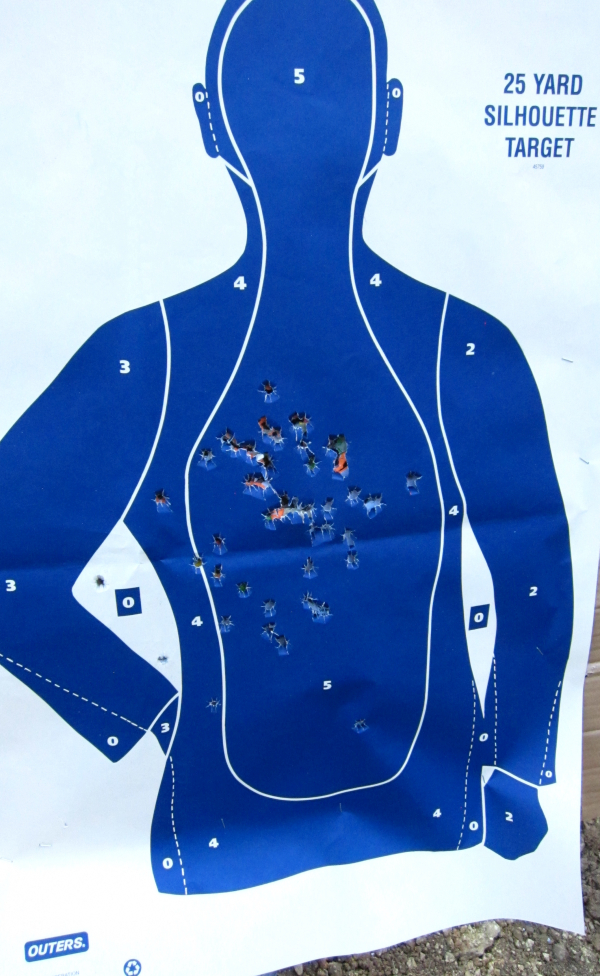It’s remarkable what you see when you’re looking for something else.
I was availing myself of video ‘learning’ through an online streaming service. It was legit, a commentator trying to evaluate techniques by testing and evaluation – I wasn’t watching an ‘action movie.’ (In my day, we’d joke about the latest Clint Eastwood (or similar) fare as a ‘training film.’)
This was legit, but I didn’t learn what I was seeking to learn. The topic was generally methods of aiming. The user tried iron sights in what he referred to as ‘flash sight picture’ against the so-called target focus versus using a pistol-mounted optic (also a target focus).
As this was a path I’d been taking, I availed myself of his lesson.
This was someone who I’d watched before and I find his presentations more appealing than some. While I don’t agree with his conclusions generally, I’ll often find something I didn’t know before. This time it was generally negative, though I did find some glitter amongst the chicken feed – it was unintentional on the presenter’s part.

Those misses under the 'arm' of the target? They're okay, on the range, when you determine what you can and can't do. Remediate those; know the distance at which you can guarantee a hit. It's what you can hit, at what distance, in what time limit.
He mentioned that an instructor had recently opined in a class he took that ‘one miss off the silhouette isn’t that big a deal.’ As a former member of a foreign military service, missing was a “detail” for the instructor, just a minor inconvenience. Our presenter noted that it’s more than a big deal for the armed citizen or civilian law enforcement – and he’s right.
Then he begins warning about liability.
Liability is serious, okay. No one wants to get booked into jail and face criminal charges. And civil liability can be lurking, in some states, for two years or more after the event – and can take many years to litigate, draining your personal resources.
Do you think that’s the worst of it? – No.
This event is potentially the death of a citizen, an uninvolved party, an innocent bystander, a potential witness for your defense; a human being. The problem isn’t just what the badges or the robes will do or say, nor the press. It’s the fact you’ll live with that tragic outcome until you don’t live anymore.
That’s really tough. If you don’t know anyone who’s accidentally killed someone, they seem to go through a torture that’s unlike any other. It’s psychic brutality. Killing someone when you intend to is bad enough. I’ve known people to suffer over that too. Or failing to save someone they believe they could have saved. The trauma from accidentally killing can cause a range of issues – and suicide is one.
Look at the suicide data for certain occupational groups. It’s that way for a reason.
According to the American College of Emergency Physicians, Each year in the U.S., roughly 300 - 400 physicians die by suicide. (Source: The American Foundation for Suicide Prevention)
Physicians face huge civil (even potential criminal) liability risks too; ever checked out the increasing rates for malpractice insurance?
How about military veterans? According to American Addiction Centers, more than 16 veterans per day perished to suicide in 2020. Nearly a quarter of all US suicides in the US are military veterans.
The police and fire service likewise see high rates of suicide, being more likely to die that way than dying “in the line of duty.“
That’s not because they “shot and missed,” unintentionally hitting someone else. That’s not the cause of self-inflicted harm in most cases. But self-doubt is a big deal and knowing that an innocent who’d be living today (or living without a crippling injury today) won’t be -- due to a shot that you fired.
That’s more a threat to your well-being than simple liability – though the judgement of society, even if it’s just in the press and isn’t litigated otherwise, can still put the pressure on conscience.
What to do about it? First, only send the shot only if you know you have the shot. To do that, you determine your baseline without the rigors of the fight. You use the laboratory of the range. You find what you can do 100% -- so you know what you may not be able to do.
Next, you need to consider the tragic consequences of battle. That drives your desire to avoid it. It teaches suppression of ego, so you don’t have to fight to prove yourself.
Avoid, evade, escape – the shot not taken is the best one. If you have to, you do.
Just please don’t miss.
-- Rich Grassi